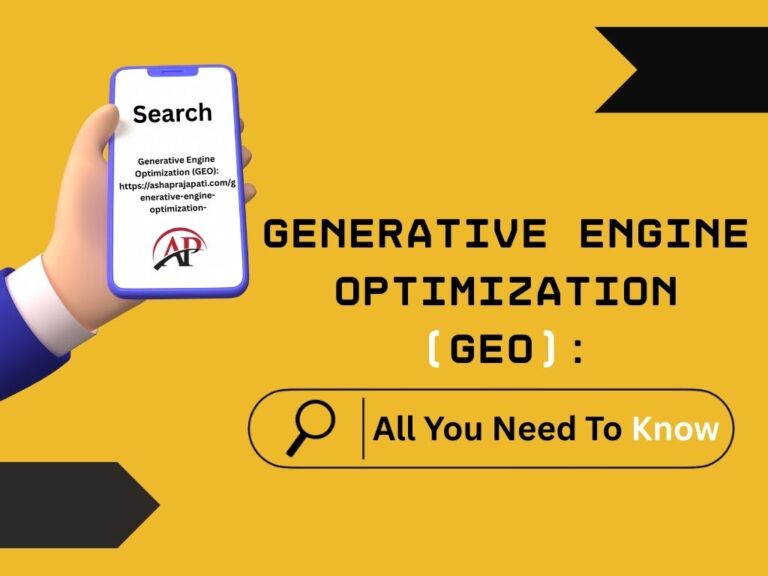
Generative Engine Optimization (GEO):
The Future of SEO in 2025
Welcome to an important discussion about the developed landscape with visibility online! In 2025, while the search engine optimization (SEO) is still a basis for Digital marketing services, but Generative Engine Optimization (GEO) is the future of SEO in 2025.. AP digital marketer believes how users want and get information, it is crucial to understand.
In the ever-evolving digital landscape, businesses are constantly seeking innovative ways to enhance their online visibility. One such emerging strategy is Generative Engine Optimization (GEO), a concept that has gained significant traction in 2025. GEO focuses on optimizing content to improve its visibility through voice search optimization in AI-driven search results and generative AI responses. Unlike traditional SEO, which primarily targets search engines like Google, GEO aims to ensure that content is effectively utilized by AI systems such as ChatGPT, Google’s Gemini, and Perplexity.
What is Generative Engine Optimization (GEO)?
Generative Engine Optimization refers to the practice of optimizing digital content and online presence to enhance visibility in AI-driven search results and generative AI responses. This involves tailoring content to be more comprehensible and relevant to AI systems, ensuring that it is accurately represented and effectively distributed. The goal is to ensure that AI systems retrieve, synthesize, and present information in response to user queries in a manner that highlights the optimized content.
Why GEO Is Emerging in 2025
Several major trends are driving the rise of GEO:
- AI Chatbots as Primary Search Tools
More people are using AI tools to ask questions directly, skipping traditional search engines. This means the visibility of a website now depends on how well AI models can find and trust its content. - Decline of Click-Based Search
As AI provides direct answers, fewer people click through to websites. Content needs to be formatted in ways that AI can cite or summarize effectively to remain visible and influential. - Voice Assistants and Smart Devices
Devices like Alexa, Siri, and Google Assistant are powered by generative AI. These tools often pull information from multiple sources to form a single, spoken response — making GEO crucial.
How GEO Differs from Traditional SEO

How GEO Differs from Traditional SEO
While traditional SEO focuses on improving rankings in conventional search engines by optimizing website content and structure, GEO specifically targets generative AI systems. This involves understanding how AI models retrieve and present information and tailoring content accordingly. Key differences between GEO and traditional SEO include:
- Content Creation: SEO traditionally focuses on optimizing human-generated content, while GEO focuses on optimizing AI-generated content.
- Technology Dependency: GEO is heavily reliant on AI and machine learning technologies, while SEO is more reliant on human expertise and analysis
- Adaptability: GEO is designed to be more adaptive to rapid changes in search engine algorithms and user behaviour due to its AI technology, where a SEO may require more manual adjustments.
- Scalability: GEO can scale content creation and optimization faster and more efficient through automation, while SEO typically involves more time-intensive processes.
- How GEO Differs from Traditional SEO (SEO vs GEO)
Here are the key differences between SEO and GEO:
SEO (Traditional) | GEO (Generative) |
Focuses on keywords and backlinks | Focuses on clear, structured, trustworthy content |
Ranks pages in Google results | Surfaces content in AI-generated answers |
Optimized for crawling and indexing | Optimized for AI understanding and context |
Depends on clicks and traffic | Depends on mentions, citations, and summaries |
Uses meta tags, sitemaps, alt text | Uses structured data, semantic clarity, and factual accuracy |
Advantages of Generative Engine Optimization
Implementing GEO offers several benefits:
- Enhanced Content Relevance
By utilize AI to generate content, GEO ensures that the material is highly relevant to user queries. This alignment with user intent can lead to better engagement rates and higher conversion rates.
- Improved SEO Performance
GEO can identify the most effective keywords and phrases to include in your content, potentially improving your website’s rankings. This can lead to increased organic traffic and better visibility on SERP as top search results.
- Personalized User Experience
GEO can enhance content to meet the specific needs and preferences of your audience, leading to higher engagement and conversion rates. Personalized content resonates more with users, enhancing their experience and satisfaction.
- Time and Cost Efficiency
Automating the content creation process with GEO can save your time and your reduce costs, allowing your team to focus on other critical aspects of your digital marketing strategy. This efficiency can lead to a better ROI( return on investment).
Disadvantages of Generative Engine Optimization
Disadvantages of Generative Engine Optimization
Despite its advantages, GEO also comes with some notable drawbacks:
- Quality Concerns
AI-generated content may lack the nuance and depth that human-created content provide. This can lead to generic or superficial content that don’t fully engage your targeted audience.
- SEO Risks
While GEO can improve SEO performance, it can also become a reason of risks. Search engines like Google prioritize high-quality, original content. If AI-generated content is not properly monitored by seo’s professionals, it may lead to penalties for perceived low-quality or Spammy content.
- Lack of Creativity
AI lacks the creative touch that human writers bring to content creation. This can result in content that feels not satisfied, formulaic and lacks originality.
- Ethical Considerations
The use of AI in content creation raises ethical questions about the authenticity, trust, and transparency of the content. It’s essential to ensure that AI-generated content aligns and monitor with ethical standards and provides value to the audience.
GEO Best Practices for 2025
To prepare for this new era of search, here are some practical steps for optimizing your content for generative engines:
- Write Clear, Accurate, and Factual Content
AI models prefer content that is easy to understand and factually correct. Avoid fluff or overly complex jargon. Use simple language and back your claims with sources.
- Structure Your Content Well
Use headings, subheadings, bullet points, and short paragraphs. AI systems are better at reading and summarizing well-organized content.
3. Use Schema and Structured Data
Add structured data to your pages so that AI tools can recognize key facts, events, prices, and names. This helps them generate more accurate and relevant responses.
- Build Topical Authority
Become a go-to source in your niche. The more consistent and reliable your content is across a topic, the more likely AI will treat your site as trustworthy.
- Optimize for AI Citations
Many generative engines cite their sources. Make sure your brand or domain name is clearly mentioned in your content, and that key insights are attributed to you.
- Focus on E-E-A-T (Experience, Expertise, Authoritativeness, Trust)
This Google principle is more important than ever. AI systems are trained to recognize credible sources. Use author bios, citations, and evidence to build trust.
How AI Chooses What to Show
Generative engines do not “rank” pages the way Google does. Instead, they evaluate content based on:
- Relevance: Does the content match the user’s question?
- Clarity: Is the content written in a way the model can easily process?
- Trustworthiness: Is the source credible and known for accuracy?
- Freshness: Is the information up-to-date?
These engines often summarize the web and offer blended answers. That means your content doesn’t have to rank #1—it just needs to be useful enough to be included in the conversation.
Tools and Technologies That Support GEO
Several tools are helping content creators adapt to the GEO era:
- AI-aware Content Platforms: Systems like Jasper, SurferSEO, and Copy.ai are integrating GEO features to help content creators write AI-friendly articles.
- Knowledge Graph Integrations: Connecting your content to Wikidata, Google’s Knowledge Graph, and other structured databases improves discoverability.
Citation Monitoring Tools: These tools track how often your content is cited by generative engines and LLMs
Challenges in GEO
As promising as GEO sounds, it also comes with some new challenges:
- Lack of Direct Analytics: Unlike SEO, it’s hard to measure exactly when or how AI engines mention your content.
- Changing AI Behaviour: AI models evolve quickly. A piece of content optimized today might not perform the same way tomorrow.
- Content Ownership and Attribution: AI engines may summarize content without linking back to the original source, making credit hard to trace.
To overcome these, brands and creators will need to focus on building strong digital identities and reputations—beyond just traffic metrics.
The Future of GEO
By 2025 and beyond, GEO will continue to evolve as generative engines become smarter and more central to everyday life and through use of voice search optimization also. We may see:
- GEO Analytics Platforms: Tools that show how often your content appears in AI-generated responses.
- AI Optimization Standards: Shared guidelines for how to format content for LLMs.
- New Discovery Channels: Content may be surfaced through AI assistants, AR glasses, and virtual agents in real time.
This means businesses, creators, and marketers need to think beyond keywords and embrace a new content philosophy: write for understanding, not just ranking.
Final Thoughts
Final Thoughts
Generative Engine Optimization isn’t a replacement for SEO—it’s the next step. As generative AI becomes more deeply embedded into how people search, learn, and make decisions, GEO will be essential for staying visible and relevant.
By creating content that is clear, trustworthy, structured, and useful, you’re not just feeding search engines anymore—you’re teaching machines how to represent your ideas in conversations across the digital world.
Are you ready to optimize for the future?
FAQ'S
1. What is Generative Engine Optimization (GEO)?
GEO is the practice of optimizing content and digital presence specifically for AI-powered generative engines (like ChatGPT, Google’s Search Generative Experience, or Perplexity), which provide synthesized answers rather than traditional lists of links.
2. How is GEO different from traditional SEO?
Traditional SEO focuses on ranking webpages in search engine results, while GEO is about ensuring your content is structured, authoritative, and visible enough to be cited or referenced in AI-generated responses.
3.Why is GEO important in 2025?
As users increasingly turn to AI assistants and generative search tools for direct answers, brands and content creators must adapt to ensure their information is included in these AI-generated outputs, or risk becoming invisible online.
4. How do generative engines find and select content?
They use large-scale language models trained on publicly available data, recent web content, structured data (like schema.org), and high-authority sources to generate responses. They prioritize relevance, credibility, clarity, and freshness.
5.What content types are most effective for GEO?
Structured FAQs, how-to guides, clearly formatted articles, and expert-level insights perform well in generative engines. Using clean semantic HTML, updated schema markup, and original content is key.
6.How can I make my content more “AI-visible”?
Use structured data, write clearly and factually, include context-rich headings, keep your content fresh, and ensure your brand or domain has strong authority and topical relevance.
7. Are backlinks still relevant for GEO?
Yes, but their role is evolving. Backlinks help establish authority, which increases the likelihood of your content being trusted and used by generative engines, though contextual relevance and clarity matter more than ever.
8. Can GEO be tracked or measured like traditional SEO?
Partially. While exact attribution is challenging (since generative engines often paraphrase sources), tools are emerging to monitor brand mentions, citation frequency, and visibility in AI-generated responses.
9. How do I optimize for Google’s Search Generative Experience (SGE)?
Focus on providing comprehensive, clear, and well-structured answers. Use schema markup, target user intent, and improve page experience. Google prioritizes content that aligns with E-E-A-T (Experience, Expertise, Authoritativeness, Trustworthiness).
10. Is GEO the end of traditional SEO?
No, but it’s a major evolution. Traditional SEO principles still matter, but GEO adds a new layer—requiring content to be AI-friendly, context-aware, and designed for generative discovery, not just search engine indexing.
Table of Contents
Toggle
